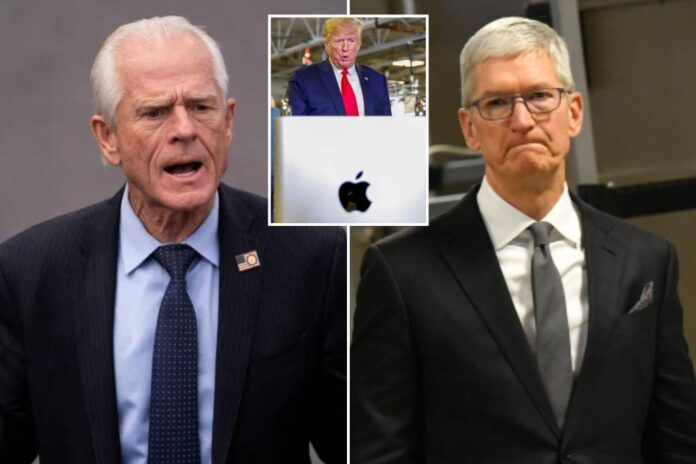White House trade advisor Peter Navarro sharply criticized Apple CEO Tim Cook on Monday over the company’s ongoing reliance on China for iPhone production, intensifying pressure from the Trump administration for Apple to bring back manufacturing to the United States.
“Going back to the first Trump term, Tim Cook has continually asked for more time in order to move his factories out of China,” Navarro said during an appearance on CNBC’s “Squawk on the Street” on Monday.
“I mean it’s the longest-running soap opera in Silicon Valley.”
Navarro said he struggled to understand why Apple hasn’t re-shored its manufacturing and shifted its complex supply chain back to the US.
“With all these new advanced manufacturing techniques and the way things are moving with AI and things like that, it’s inconceivable to me that Tim Cook could not produce his iPhones elsewhere around the world and in this country,” he said.
The Post has sought comment from Apple.
Navarro’s remarks follow months of escalating rhetoric from President Trump, who has made Apple a focal point of his renewed push for domestic manufacturing.
Trump has demanded that Apple manufacture all iPhones sold in the US within the country, threatening to impose a 25% tariff on devices made abroad.
“I have long ago informed Tim Cook of Apple that I expect their iPhones that will be sold in the United States of America will be manufactured and built in the United States, not India, or anyplace else,” Trump posted in May 2025 on Truth Social.
“If that is not the case, a Tariff of at least 25% must be paid by Apple to the US.”
Apple currently assembles the bulk of its iPhones in China, though it has increasingly shifted production to India in an effort to diversify supply chains and sidestep rising costs associated with tariffs.
Despite these moves, analysts and supply chain experts argue that fully relocating iPhone production to the US would be logistically and economically impractical. Some estimates suggest a domestically manufactured iPhone could cost as much as $3,500.
During Trump’s first term, Apple pledged to assemble its $3,000 Mac Pro in Texas, but the company continues to produce very few devices within the US.
In February, Apple said it would invest $500 billion in the US, including toward assembling some AI servers.
Trump has made clear that he views Apple’s shift to India as unacceptable. The president said he communicated this message directly to Cook in May.
“You’re my friend. I’ve treated you very well… but now I hear you’re expanding over India. I don’t want you in India. We want you to produce here [in the U.S.],” he said in comments directed at Cook.
“India can handle themselves, they are thriving, we want you to manufacture here,” Trump said.
Every morning, the NY POSTcast offers a deep dive into the headlines with the Post’s signature mix of politics, business, pop culture, true crime and everything in between. Subscribe here!
The two reportedly met at the White House in May, shortly before Trump issued public threats of tariffs, although no details of the meeting were disclosed.
While Apple has avoided public confrontation, its strategy to move some manufacturing to India and Vietnam reflects ongoing efforts to diversify. However, the company’s reliance on China remains substantial due to a combination of factors, including scale, infrastructure, labor and supply chain integration.
China provides Apple with a vast and highly skilled manufacturing workforce. A single Apple supplier in China can hire 3,000 workers overnight — capabilities unmatched elsewhere.
The country graduates about 600,000 engineers annually, compared to 70,000 in the US, offering Apple the technical talent needed for its complex devices.
Additionally, China’s manufacturing ecosystem provides the precision, tooling and tightly clustered suppliers that Apple depends on to produce its flagship products. Many components are manufactured just miles from final assembly plants, allowing for efficient, just-in-time logistics and rapid adjustments to changes in demand.
Despite rising labor costs in China, the overall cost of production remains lower than in the US due to established infrastructure, logistics networks and government incentives like subsidies and tax breaks.








